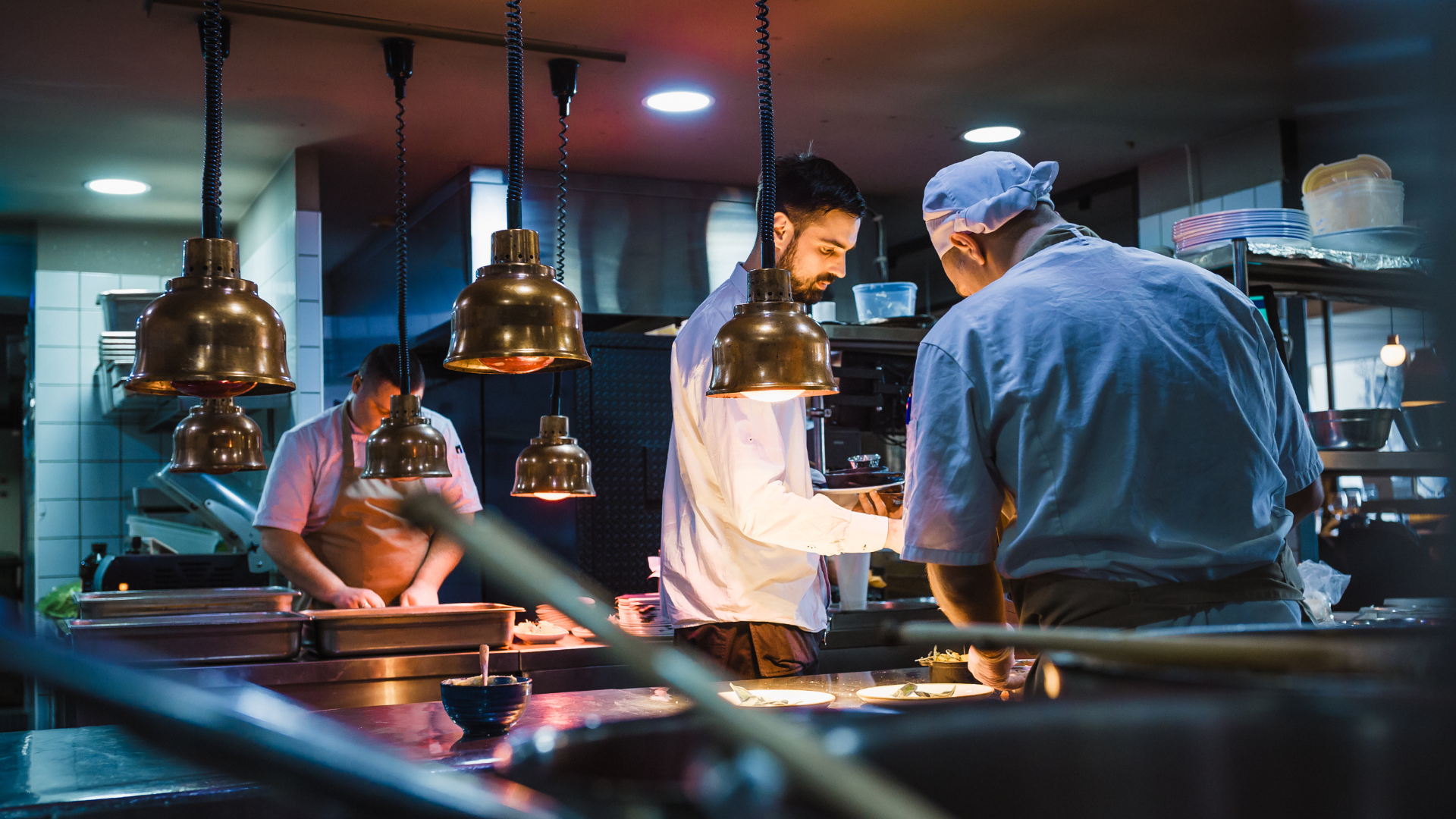Even if you have an outstanding marketing plan and a premium location, slow sales and low footfall seasons are unavoidable in any restaurant business.
Restaurant owners need a precise and effective strategy to consistently address slow sales. Otherwise, you may experience damaging periods of low revenue and reduced profits.
Here are some of the main causes of slow sales in restaurants and 10 efficient ways to deal with them.
What are the causes of slow sales in a restaurant?
Some potential causes of slow sales in your restaurant include:
- Lack of disposable income: During periods of financial struggle, diners may not have enough disposable income to eat out regularly. Our Beyond the Booking reports on hospitality trends, suggests that 62% of diners in Australia and New Zealand who plan to eat out less in 2025 state it is due to a lack of disposable income. 68% of diners in the UK and Ireland eating out less say the same.
- Slow seasons for specific venues: A venue may go through downturns due to seasonal factors. For instance, a seaside venue may experience a slump in foot traffic during the winter months.
- Internal business issues: To maintain consistent sales, a business needs to be offering a quality product. Internal issues in the restaurant, such as bad customer service or poor food quality, will reduce customer numbers and sales.
- New direct competitors: A new competitor opening in the same location as your business could slow down your daily sales and foot traffic, as customers see what new venues have to offer.
- Poor brand positioning: Your venue’s customer experience and menu pricing must match the interests of your chosen target market. With improper menu pricing, you may be pricing yourself out of your customer’s range, or making a net loss on the cost of your ingredients.
10 ways to deal with slow restaurant sales
Choosing the right way to tackle slow restaurant sales is crucial for long-term success. Here are 10 of the best strategies you can employ:
1. Analyse your data
As a restaurant owner, you need to understand why your sales are slower before you decide how to fix them. You need a thorough overview of your business and vital data points like peak booking times, menu popularity, and more to determine why slumps are occurring.
With ResDiary’s analytics suite and quality integrations, you can precisely identify the times at which your sales are slow. For instance, through your booking data, you can clearly see which days of the week are your most popular, what the most common booking times are and which season has fewer customers.
With electronic point of sale (EPOS) integrations such as AccessEPoS or PowerEPOS from Triniteq, you have further metrics to better understand sales slumps. With data in areas like average spend per head and popular menu items, you can see where your business is making money, and where you are losing it.
By gathering and analysing as much restaurant data as possible, you’ll have the actionable insights you need to improve your business.
2. Level up your marketing
Effective marketing is vital to increasing your restaurant’s visibility and offers several ways to boost bookings during slow periods. With a great marketing strategy, you can leverage multiple channels to advertise specials, promotions and events. This helps you to gain more customers during slow seasons and ensure more consistent growth.
With ResDiary’s email marketing solution, you have a simple, personable way to consistently reach out to diners. You can use email marketing to automate messages and directly follow up with customers after they’ve booked or dined at your restaurant.
You can also reach out with specials and promotions. Using our Silverstreet integration also allows you to reach out to your customers via SMS marketing.
With CRM integrations like Talkbox by Impact Data and Acteol, you have the tools to gather customer data and create a thorough profile of your customer’s preferences. This enables you to market to them more effectively. You can take advantage of two-way data flow with ResDiary to put your booking data to the best possible use within these integrations.
With the right marketing strategy, you can counteract slow sales periods and set your business up with consistent long-term foot traffic.
3. Grow your online presence
Slow sales may be caused by patrons not being able to find you through their preferred channels. You must ensure your business has a strong and visible presence online on search engines and social media.
Our Beyond the Booking report suggests that 36% of diners in Australia and New Zealand use social media to find restaurants, and 20% of them use search engines. In the UK and Ireland, 28% of diners rely on social media to find restaurants, while 33% use search engines.
As a restaurant, you should prioritise SEO and social media marketing to grow your brand online and build a positive reputation with customers. With ResDiary integrations, your diners can book directly through Reserve with Google as well as Facebook and Instagram.
This cuts down the time they may spend on competitors' pages and secures more reservations for you.
You can also try utilising diner discovery platforms to extend your reach:
- DesignMyNight is a UK hospitality platform that shares your brand with over 3.9 million UK users on the lookout for hospitality venues. With ResDiary’s DesignMyNight integration, you can easily set up a venue listing page for diners to discover and make bookings via, automatically syncing with your ResDiary reservation diary.
- Quandoo, which is used by diners in eleven countries (including Australia and New Zealand), drove over 400 million diner reservations worldwide last year. ResDiary’s integration with Quandoo makes it even easier to get discovered online and attract table bookings from new customers.
- Restaurant Hub also integrates with ResDiary to connect your business to 2.4 million diners across New Zealand, and 25+ top affiliate sites like NZ Herald, Air New Zealand, and more. Showcase your venue with photos, tailored descriptions, and spotlight promos, ensuring that diners find exactly what they’re looking for!
Another important factor in increasing your online presence that many business owners neglect is a well-designed website. This enables you to more consistently guide patrons into making bookings when they visit your site. Check out our guide on website design to boost reservations and streamline the customer journey for more information.
4. Specials, promotions and events
If you have identified when your restaurant gets the least customers, such as on specific days or during the winter months, you can directly increase your bookings by creating specials, promotions and events. Promotions even let you address your customers' lack of disposable income with discounts and package deals.
Specials, promotions and events are some of the most popular and successful ways to increase a restaurant's bookings. The Beyond the Booking report states that 48% of venue operators in Australia and New Zealand will run more general events in 2025, 45% will focus specifically on seasonal promotions, and 38% will focus on special offers to encourage more diners during off-peak times.
In the UK and Ireland, these figures are 42%, 44%, and 42%, respectively.
With ResDiary’s promotions feature, you can efficiently manage special events and promotions. Promotions can be displayed in a widget on your website, and you can automate messages and texts to ensure your customers are aware of them.
ResDiary has a host of event management features to make running events in your business smoother than ever. With ResDiary’s Tonic integration, you can make ticketing a breeze. You can also get more visibility for your event on platforms like DesignMyNight in the UK and Quandoo and Restaurant Hub in Australia and New Zealand.
You can also offer pre-orders and pre-payments, and easily assign event responsibilities to staff members. ResDiary is the perfect tool to fight slow sales through promotions and events.
5. Focus on your customers
Slow sales may be caused by internal issues within your restaurant. If you are not offering good food and are offering subpar service, customers will not make repeat bookings with your restaurant. They may even share their negative experience with friends and family, affecting your brand's reputation.
By focusing on your customers and ensuring they have a positive experience, you are building loyalty to your brands and crafting a positive relationship. Loyal customers who trust in the quality of your business are likely to book more regularly with your business, boosting your slower periods.
Ensure you take the proper steps to improve your restaurant's service quality. Train your staff to prioritise customer relations, solicit and apply customer feedback, and optimise your restaurant operations to give your staff more time to focus on patrons.
With ResDiary, you have high-quality table management software to help your staff get off inefficient pen and paper booking systems and generally streamline your operations. ResDiary’s booking notes enable you to tailor your services to your customers more effectively.
With quality integrations like Talkbox and Acteol, you can craft a thorough profile on your customers to meet their needs more precisely. This enables you to more effectively service your customers, and encourage them to return for more.
6. Optimise your operations
Optimal service in your restaurant doesn’t just affect your customer’s experiences. If you have inefficient daily operations, you could be losing revenue and your staff may not have enough time to focus on important tasks.
Optimising your restaurant will help you increase restaurant sales and bring down daily operation costs. Proper optimisation ensures you are using your inventory efficiently and avoiding over-ordering.
With poor operations, staff may be waiting on other employees to finish their tasks before they can begin their own, causing bottlenecks and slowing down services. By streamlining operations, you can simplify or automate time-consuming tasks, make it easier for staff to perform their duties, and prevent stalls or bottlenecks from costing your business.
ResDiary’s features and integrations allow you and your team to streamline your operations with easy-to-use software to offer exceptional service. You can use ResDiary’s smart rules to automatically control the flow of bookings. With this feature, your diary only accepts bookings that meet your conditions, such as a minimum number of covers for a table.
You can also set up diary segments for certain times of year. For example, you can open up outdoor areas during summer. You can easily run service including your new space in your diary, then switch back to your regular table plan when summer is finished.
With ResDiary’s Rotaready integration, you can more effectively manage your reservations and rotas with two-way data flow. Rotaready helps managers monitor wage spending and manage schedule shifts based on future demand. With this integration, you can use real-time reservation data to ensure the right number of people are on staff.
These tools all help to contribute to a more streamlined, smoothly-run restaurant that consistently provides great food and service. With optimised operations, it becomes easier to run a profitable venue.
7. Maximise your menu
Your menu is a key part of your business’s total revenue and profits. It is the main feature of your business and plays a major role in your operational expenses.
By optimising your menu, you can ensure your back-of-the-house team can consistently produce good food and generate profit for your business. To maximise your menu, you need to choose a menu pricing strategy that suits your business and your customers.
Profitable pricing strategies for restaurant menus include:
- Food cost percentage pricing: Guarantee a base profit on each dish sold by calculating how much each dish costs to make and adjusting your price based on the food cost percentage. Simply add up the total cost of ingredients that go into your menu and raise the price to ensure a profit. The most commonly cited ideal food cost percentage is 28-35%.

- Cost-plus pricing: Adjust your menu prices to factor in food cost percentage and your venue's operational costs, like rent, staff wages, and operational costs per dish made. This strategy ensures you are factoring in your total overhead costs, but it is crucial that you have precise data for a cost-plus pricing menu. ResDiary integrations like AccessEPoS and PowerEPOS can ensure you have all the needed data to make this strategy effective.

- Competitive pricing: A competitive pricing strategy can be used to undercut competitors, maximise covers, and attract more diners. However, this may come at the expense of your profits. Analyse your competitor’s menu pricing and adjust your prices to undercut by a small amount for the most effective results. Be sure to create a restaurant sales forecast to determine if this strategy is right for you.
- Dynamic pricing: Change your prices to capitalise on peak periods and offer more incentives during off-seasons with dynamic pricing. This strategy allows you to fluidly adjust your pricing to match trends immediately but requires you to stay ahead of the curve as much as possible. Using ResDiary’s analytics suite, you can gain the actionable data you will need in order to make dynamic pricing viable.
8. Expand your range
If you are currently dealing with a slow sales season, you can try expanding your range to attract new customers with trendy menu items or other brand-new offers. For best results, expand your menu based on customer feedback. For example, if a special dish is particularly popular and repeatedly mentioned, try adding it as a permanent part of your menu.
Your restaurant can also offer take-home items and branded merchandise as part of its expanded range. This could mean selling a seasoning that is signature to your dishes. If patrons enjoy your brand's particular appeal, you could offer keyrings, tote bags or other branded apparel.
Ensure your customers get the most out of your expanded range by creating gift vouchers. With ResDiary’s Stripe integration, you can offer physical and digital vouchers. These provide upfront revenue for your business and are a great way to diversify your offerings.
9. Upselling and cross-selling
Upselling and cross-selling are powerful techniques for combatting slow sales in your restaurant. Upselling involves persuading customers to purchase more expensive items on your menu. Upselling techniques in restaurants can include offering samples, advertising a ‘chef’s selection’ menu, and training staff in techniques to encourage purchases.
With persuasive upselling, you can increase your average order value per customer and showcase your highest-quality dishes.
Cross-selling involves offering particular menu items in conjunction with another item on the menu. A common form of cross-selling is offering a wine pairing for a particular dish on your menu.
If you own a chain restaurant or have multiple venues in your brand, you can also cross-sell your own venues. Using ResDiary’s Cross-Sell Widget, you can offer seating at a different venue in your brand if a customer’s preferred reservation time is not available.
By upselling and cross-selling between restaurants, you can earn more reservations across your venues, and you’ll ensure no part of your business is neglected.
Upselling and cross-selling can greatly increase reservations, give customers the chance to eat at their preferred booking times and address your sales slumps, all at once.
10. Encourage repeat business
Encouraging repeat business is a crucial foundation for any restaurant’s long-term financial stability. Repeat business ensures you mitigate the impact of slow seasons. You can also mitigate the time, money and effort needed to bring in new customers.
Ensuring you have consistent repeat business ultimately comes down to providing great food and service every time a customer visits. Diners will be much more willing to come back if they believe they will receive the same high-quality experience each time they visit. Repeat business can also be encouraged by regularly contacting your customers via email and SMS.
ResDiary can help drive repeat customers through text and email marketing. With ResDiary’s built-in email marketing features, you can automate follow-up messages to customers for feedback and reviews, or send out specials and promotions. Using ResDiary’s Silverstreet integration, you can also drive more repeat customers through SMS messaging.
This helps to maintain a long-term relationship with your diners, mitigating the impact of slow sales.
Create a profitable restaurant with ResDiary
You can rely on ResDiary to have the tools you need to create a sustainable business that can manage down periods. From data analytics to streamlining operations for your staff and managers, we can help you turn slow restaurant sales into consistent profits.
Put together a precise marketing campaign using ResDiary’s features and integrations, and craft comprehensive profiles on your customers for better service. Stop low foot traffic and slow sales periods by creating promotions and events to encourage more business all year round.
Help address your slow restaurant sales by booking a demo with ResDiary today.




.gif?width=446&height=446&name=DesignMyNight%20Website%20(4).gif)





